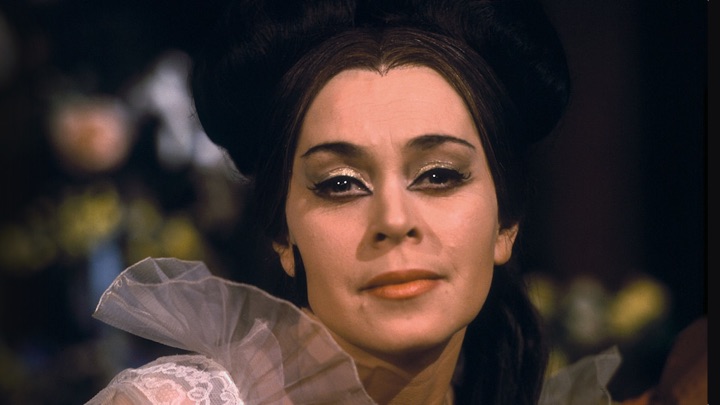
On Thursday March 13, 1986, Opera Orchestra of New York welcomed back Gabriela Benackova after an absence of seven years to perform Smetana’s Libuse. For my first time hearing the Czech soprano, she was magnificent as those who have listened to the broadcast posted last year on Trove Thursday must agree.
Sunday evening Intermezzo, elegantly semi-staged by its superb translator Andrew Porter, gave Söderström possibly the greatest role of her very long, but sparse New York opera career.
Mozart and Strauss inevitably bracketed her Met appearances; Söderström debuted in 1959 as Susanna in Le Nozze di Figaro and several months later sang Sophie at a Saturday matinee of Der Rosenkavalier which also featured Christa Ludwig’s first local Octavian. The Swede performed with the Met an astonishing 27 times her first season but afterward appeared far less regularly. After her second Met Ariadne auf Naxos Composer in 1964, she didn’t return to perform an opera with the company until 1983. She did contribute one song to the 1977 Met Marathon during a stopover as she was returning to Europe after Kat’a Kabanova at the San Francisco Opera.
The Met’s 1982-83 season opened with Der Rosenkavalier and its starry cast of Kiri Te Kanawa, Tatiana Troyanos and Judith Blegen was also featured several weeks later on a live telecast. But seven lucky cities on that spring’s tour itinerary heard Söderström, Frederica von Stade (her only Octavians with the company) and Kathleen Battle instead! Though they never appeared together in the opera at Lincoln Center, they got the honor of performing the Rosenkavalier trio at the epic Centennial Gala that fall. It proved one of that celebration’s stellar highlights.
Many assumed that when Söderström finally performed the Marschallin at Lincoln Center in 1987, it would be her Met farewell. However, after a dozen years, she returned one final time for the Countess in Pikovaya Dama which was widely considered unsuccessful. I would instead prefer to remember her in the other Met performance of hers I attended: a Nozze in which her Countess was reunited with Battle and von Stade, along with José van Dam and Thomas Hampson just weeks after he debuted as the Count. It was, it must be admitted, rather late for Söderström in that role, but her Mozartian elegance still shone amid that distinguished cast.Like Helen Donath also at the Met (and Hilde Gueden. Lucia Popp, Margaret Price and many others elsewhere), her Countess—coming 27 years after Susanna—placed her among the starry company of those ladies who performed several Nozze roles. She surely also sang Cherubino somewhere early in her career.
Söderström performed the same hat trick with Rosenkavalier—Sophie and the Marschallin for the Met as well as Octavian on the Decca highlights recording with Régine Crespin and Hilde Gueden. Her partnership with Crespin can also be heard in a complete Glyndebourne Festival Rosenkavalier available here.
For 20 years, Glyndebourne would be one of her artistic homes. She debuted there as the Composer and in addition to Octavian also performed the Capriccio Countess many times. And it was at the English festival that in 1973 she first tackled Intermezzo in the delightful Porter translation.
While I admit that Benackova’s Libuse had been my prime motivation to fly to New York that March, but all these years later Intermezzo (thanks greatly to this recently received recording) has proven to be the trip’s most indelible memory—far outstripping, for example, Maria Ewing’s “unorthodox” Carmen.
Intermezzo’s Christine can easily become an intolerable termagant but Söderström made her completely irresistible even when her neurotic self-absorption should have driven her husband—and the audience—crazy. The soprano’s exotically charming accent in English (amidst an all-North American cast) subtly reinforced Christine’s status as an outsider in her husband’s circle. The soprano’s thoughts about the opera are included in a delightful New York Times interview published just before the Carnegie Hall evening.
Though the handsome Titus was 18 years younger than his chic colleague, one never doubted Storch’s utter devotion to his often-maddening wife. Their obvious chemistry made them a wonderfully charismatic couple (as they had apparently also been two years earlier at the Santa Fe Opera) and their inevitable, rapturous reunion brought down the packed house.
Trove Thursday 2021 has been preoccupied by New York City’s important unstaged opera history by celebrating the 70th anniversary of the American Opera Society and the 50th of Opera Orchestra of New York.
And for just four dazzling seasons in the mid-1980s, Matthew Epstein curated a concert-opera series of which Intermezzo was the jewel of its final run which also included Capriccio and Daphne.
Trove Thursday has featured quite a few other wonderful performances from those four seasons, including La Donna del Lago and Semiramide; Orlando and Ariodante from its Rossini and Handel celebrations, respectively, as well as von Stade (and Madeline Kahn) in Offenbach’s La Pêrichole.
I had to do a bit of a patch job on this recording, so some listeners (especially those listening with headphones) may notice a slight hum during a chunk of the first act; otherwise, this irreplaceable in-house recording sounds like a fine broadcast.
Following the recent “Vierzig Letzte Lieder” feature and Teresa Stratas’s Komponist, after this week no more Trove Thursday Richard Strauss for a while!
Strauss: Intermezzo (in English)
Carnegie Hall
16 March 1986
In-house recording
Christine: Elisabeth Söderström
Hofkapellmeister Robert Storch – Alan Titus
Anna: Melanie Helton
Baron Lummer: Peter Kazares
Der kleine Franzl: Nichollas Apostolopoulos
Kapellmeister Stroh: Mallory Walker
Kommerzienrat: Robert Orth
Justizrat: David Malis
Kammersänger: Kevin Langan
Der Notar: John Fiorito
Seine Frau: Jean Kraft
Fanny, die Köchin: Katherine Hewett
Therese: Angelina Réaux
Orchestra of St. Luke’s
Conductor: Julius Rudel
Another of Söderström’s important New York concert opera appearances was as Dido in Aeneas I Kartago at Alice Tully Hall in 1980. Trove Thursday several years ago posted a Stockholm broadcast of this fine Joseph Martin Kraus opera featuring the luminous soprano in sovereign form.
Intermezzo can be downloaded by clicking on the icon of a square with an arrow pointing downward on the audio player above and the resulting mp3 file will appear in your download directory
In addition, more than 400 other podcast tracks are always available from Apple Podcasts for free, or via any RSS reader.
The archive which lists all Trove Thursday offerings in alphabetical order by composer was recently up-to-dated.



